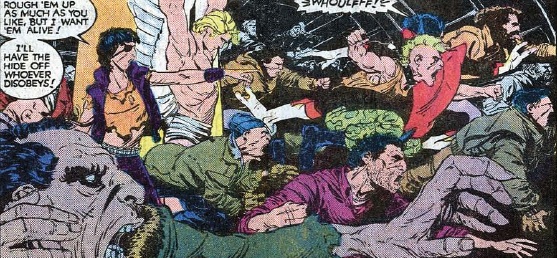What’s Next for The Gifted Season 2
The showrunner of the best straight X-Men TV show talked Morlocks & the mutant metaphor on screen.
During The Gifted’s first season, Matt Nix and company hit on many of the things X-Men fans love about the franchise: good guys fighting bigotry and oppression; soapy, complicated interpersonal relationships; and badass power combos. And, like a Blink/Thunderbird teleported Fastball Special, the show’s ability to combine traditions of the comic stories with cultural relevance made it one of the most faithful X-Men adaptations yet.
Showrunner Matt Nix told us about the core of his story and what to expect from The Gifted Season 2.
Read the Den of Geek SDCC 2018 Special Edition Magazine Here!
The Andy/Lauren relationship was the linchpin of season one. Is there going to be a similar hinge in season two’s story?
Matt Nix: There are a couple big ideas that we’re exploring. One is the idea that there are a lot of different ways to fight for freedom, and they are not all necessarily compatible. We didn’t want to go into next season doing a good-guys-versus-bad-guys kind of thing because that’s not what it’s about. We really wanted to explore the different philosophies and perspectives, with the idea that everybody believes in what they’re doing and they’re going about it in different ways, and they all see themselves as fighting for freedom.
Then the other thing is what’s more important, your fight or your family? Especially in the relationship between Polaris and Eclipse now that there’s a baby in the picture.
The Morlocks are going to come in in a big way, and Blink’s relationship to the Morlocks is going to be a big question. There’s a lot of things going on, but we’re still exploring the Struckers, especially with what Reed found out about himself last season.
The Morlocks were always the other side of the X-Men universe in that the X-Men were the good-looking mutant kids who could pass on the surface and for the Morlocks, like for the Resistance in The Gifted, life sucks because they’re mutants. Are the Morlocks going to play an amplifying role when you bring them in or are they a separate angle on the mutant story?
One big question that we’re exploring with the Morlocks is the idea of passing. Can you pass in the world above? Obviously if Thunderbird wanted to just go out and be a good-looking guy who happened to be kind of strong he could do that. He could just pretend and pass, but that’s not an option for Blink.

One thing classically about the Morlocks is they’re a group onto themselves. They’ve created this community for themselves and the idea is, hey, if you’re going to live with us, you’re going to live by our rules. We’re not running around saving people above the ground, unless it’s a pretty specific situation.
There’s a distinction between the Mutant Underground and the Morlocks that involves the obligation a group has to the wider world. Is a separate peace legit?
That’s a big question that we’re going to explore, and the idea that there is a difference between someone who is philosophically committed to your fight but can bail out at any point. Is that person somehow less committed by virtue of not having scales? Or bright green eyes and pointed ears? That’s a divide that we’re going to explore.
The mutant metaphor is probably as timely now as it has been in the last 25 years. Did you feel added pressure when you were creating the show because the world around it was creating a feedback loop on the X-Men metaphor?
Yes, is the short answer. After a big political event, I remember thinking, “Oh, wow. What we do with this show just got more important. How we treat these issues just got more important.”
In the first season when Thunderbird says we don’t stop helping desperate people because one of them might be dangerous, it was not a coincidence. At the same time, though, I do think that one of the things that we’ve tried to do is we made some efforts to humanize Roderick Campbell and talk about where he was coming from. We don’t want to turn it into sort of a straightforward political polemic.
At the Humanity First conference at the end of last season there’s a political consultant who talks about how basically some gun rights advocates are with the mutant cause and some are not. It doesn’t line up precisely with our current politics.
Gay rights has been a huge metaphor in X-Men, and rightly so, but we like the idea that maybe now maybe in our universe some gay rights people are totally down with the mutant cause, and others might be like, “Well, why are we identifying with this group that could be dangerous when we’re just trying to live our lives?” So that we’re not just saying that mutant rights fall onto a completely traditional left/right divide.
What are you most excited about for season two?
I love exploring why the so-called bad guys might be right. That is really exciting to me, so really digging in to some of the new characters that we’re going to be exploring and these different philosophies, and really challenging the mutant underground who, in their own mind certainly they’ve always been the good guys.
In Grant Morrison’s X-Men run, one of the things that I was really struck by was how Magneto was struggling with what he was doing, and what was right about it and what his goals were and what he really wanted, and the compassion of the bad guys, the ways that bad guys can be motivated by love.
That’s really fun for me, and that is reflected this year in how the Morlocks approach things. Also, we’re going to see more of how the Purifiers approach things, and the idea of how essentially good-hearted people who feel they are helping, how can that lead to disaster?
The Gifted returns to Fox this fall.
